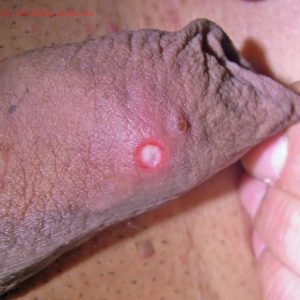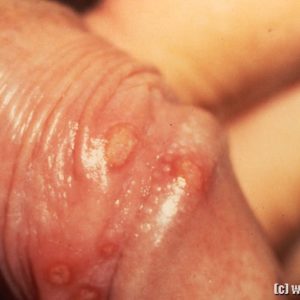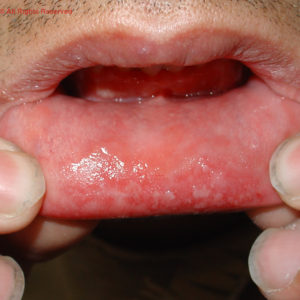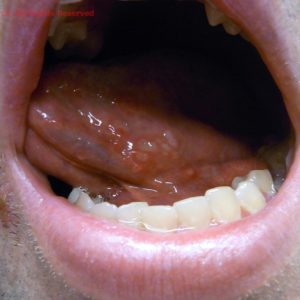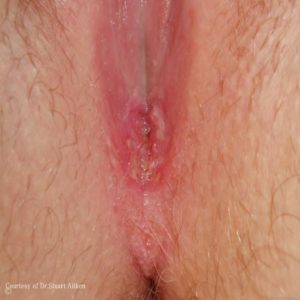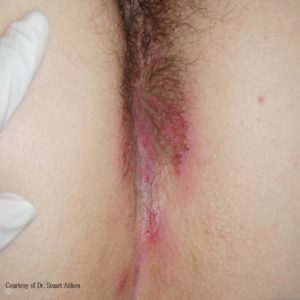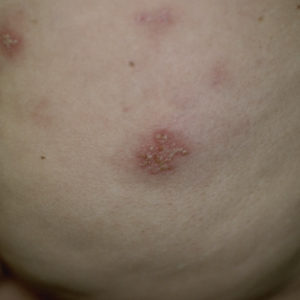Herpes (herpes simplex virus)
Herpes is a common and highly contagious infection caused by the herpes simplex virus (HSV). Herpes/HSV is spread through skin-to-skin contact and can cause sores or blisters in or around the mouth or genitals.
There are two main types of Herpes/HSV:
- HSV-1, which causes oral herpes. It usually affects the mouth and surrounding skin but can also affect the genitals. It is often called ‘cold sores’.
- HSV-2 causes genital herpes (but can also affect the face) and is usually sexually transmitted. It is generally a more severe infection, often including fever and flu-like symptoms.
It is estimated that around 70-80% of Australian adults have been exposed to HSV-1, and approximately 12% have HSV-2.
Most herpes infections are asymptomatic or mild enough that many people do not realise they carry the virus. There is no cure for herpes, but medication can help manage and reduce the severity of symptoms, the frequency of outbreaks, and the risk of transmission.
Herpes is a common and highly contagious infection caused by the herpes simplex virus (HSV). Herpes/HSV is spread through skin-to-skin contact and can cause sores or blisters in or around the mouth or genitals.
There are two main types of Herpes/HSV:
- HSV-1, which causes oral herpes. It usually affects the mouth and surrounding skin but can also affect the genitals. It is often called ‘cold sores’.
- HSV-2 causes genital herpes (but can also affect the face) and is usually sexually transmitted. It is generally a more severe infection, often including fever and flu-like symptoms.
It is estimated that around 70-80% of Australian adults have been exposed to HSV-1, and approximately 12% have HSV-2.
Most herpes infections are asymptomatic or mild enough that many people do not realise they carry the virus. There is no cure for herpes, but medication can help manage and reduce the severity of symptoms, the frequency of outbreaks, and the risk of transmission.
Signs and Symptoms
If symptoms occur, it will often be within 2 – 12 days of exposure. They can also appear days or years after exposure to the herpes virus. If left untreated, herpes symptoms can become more severe and last longer, increasing the risk of transmitting the virus to other people.
Recurring outbreaks of genital herpes generally become less frequent and less painful over time. HSV-1 tends to be associated with less severe and less frequent episodes than HSV-2. Episodes can last for 7-10 days.
Vagina/Vulva
Herpes often shows no symptoms at all. If you get symptoms, they may be:
- Groups of itchy or painful blisters on your vagina, vulva, cervix, and/or groin area that can break and turn into painful red sores
- Stinging or tingling
- Inflammation that looks like a rash or cracked skin
- Difficulty urinating
- Thick and clear, white, or cloudy liquid vaginal discharge, sometimes with a ‘fishy’ smell
- New infections can include fever, body aches and swollen lymph nodes.
Penis
Herpes is often asymptomatic. If signs or symptoms are present, there may be:
- Groups of itchy or painful blisters on your penis, scrotum and/or groin area that can break and turn into painful red sores
- Stinging or tingling
- Inflammation that looks like a rash or cracked skin
- Difficulty urinating
- Thick and clear, white, or cloudy liquid penile discharge, sometimes with a ‘fishy’ smell
- New infections can include fever, body aches and swollen lymph nodes
Anus/Rectum
Herpes often has no symptoms. If signs or symptoms are present, there may be:
- Groups of itchy or painful blisters on your anus and/or rectum that can break and turn into painful red sores
- Stinging or tingling
- Inflammation that looks like a rash or cracked skin
- An urgent need to poo
- Bloody or mucous discharge
- Constipation
- Rectal and lower back pain
- New infections can include fever, body aches and swollen lymph nodes.
Mouth/Throat
Most people do not display symptoms of Herpes/HSV. If signs or symptoms are present, there may be:
- Group of itchy or painful blisters around your mouth or at the back of your throat (cold sores) that can break and turn into painful red sores
- Tingling, itching or burning sensation around your mouth before the appearance of sores
- A sore throat (herpes of the throat)
- Chest pain (herpes of the throat)
Eyes
- Redness of the eye
- Aches or pain in the eye
- Watering
- Blurred vision
- Light sensitivity
Symptom Images (content warning: click or tap to expand)
Transmission
Herpes is easily spread from skin-to-skin contact with someone who has the virus. You can get it when your genitals and/or mouth touch their genitals and/or mouth – usually during oral, anal, and vaginal sex. The virus enters the body through small cracks in the skin or the lining of the mouth, genitals, anus and under the foreskin.
Activities that can transmit herpes include:
- HSV-1 (oral herpes)
- Mouth-to-mouth contact (such as kissing)
- Oral-to-genital contact (such as oral sex)
- Oral to anal contact (rimming)
- HSV-2 (genital herpes)
- Genitals/anus to genitals/anus (such as penetrative vaginal or anal sex),
- Anus/genitals to mouth (such as oral sex)
- Mother to baby (usually during vaginal delivery, but rare). People who are pregnant and have genital herpes should inform their midwife or doctor.
Herpes/HSV is most easily spread when there are blisters or sores, but it can still be passed even if a person has no current symptoms. Herpes is most infectious between the first signs of sores developing (including tingling and numbness) until the scabs have gone.
Prevention
As herpes/HSV is transmitted through skin-to-skin contact, there is always a risk of transmitting or getting herpes for any sexually active person, no matter how careful they may be.
Here are some ways to reduce your risk of herpes/HSV infection
- Use condoms or dental dams as barriers (even with no visible symptoms). Remember that they will only protect the skin directly covered by the barrier.
- Avoid skin-to-skin contact with blisters, sores or other potential herpes symptoms, especially around the genitals.
- If cold sores are present, avoid kissing and do not allow the mouth to touch the vagina or anus.
- If a client shows potential herpes symptoms, you can offer alternative services, such as hand relief, erotic massage, voyeurism, etc.
If you already have herpes, here are some ways to reduce the transmission risk.
- Using condoms or dental dams (even when you are not having an outbreak) can provide some protection from herpes transmission. Remember that they only protect the skin directly covered by the barrier.
- Don’t touch herpes sores on yourself or others. If you do, wash your hands thoroughly with soap and water immediately after.
- Transmission is more likely when a sore is present. If possible, avoid sexual contact from the time you first experience any symptoms until the sore has completely healed (the scab has fallen off, and there is new skin where the sore was).
- Avoid kissing services if you have a cold sore on your mouth.
- Some medications may also reduce the risk of passing on herpes (see ‘treatment’ below).
- Learn how to tell when an outbreak is coming. You may feel a burning, itching, or tingling, indicating you are about to get sores.
- Do not share food/drink containers or products like lipstick if you have a cold sore.
- Looking after yourself – herpes outbreaks are more common when unwell or stressed.
Testing
Here’s some information about testing for herpes/HSV. You can view a list of sex worker-friendly sexual health clinics on our Where To Test page.
Testing Method
- Swab from a blister or sore
- There is a blood test available, but this will only tell you whether you have ever been exposed to a herpes virus.
When to Test
- You should get tested if you show symptoms of genital herpes (HSV-2).
- It is best if the sore is less than 4 days old.
- It is not recommended to test people with no symptoms of herpes/HSV, and herpes testing is not part of routine sexual health screening.
Other Info
- A negative test could either mean that you don’t have the infection or the virus was not present on the skin when the swab was collected.
- If you are concerned that you have been exposed to herpes but do not have any symptoms, discuss this with your doctor or sexual health nurse.
- You can be tested for HSV-1, but most people can treat cold sores at home.
- Sexual health clinic testing is often bulk billed, even if you don’t have Medicare, so the test will most likely be free.
- You may pay a fee or be bulk billed if you see a GP.
Treatment
There is no cure for herpes, but the symptoms are treatable. Here’s what you need to know about treating it.
Treatment Method/s
Oral Herpes (HSV-1)
- Topical therapy (cream or ointment) is available through pharmacies.
- Oral antiviral medication is available over the counter from pharmacies or by prescription from a doctor and is usually a single dose.
- The sooner you start to treat an HSV-1 outbreak (ideally at the first sign of tingling or burning), the more effective it will be.
- Cold sores usually clear up without treatment within 7 to 10 days.
Genital Herpes (HSV-2)
- Antiviral medication prescribed by a doctor can reduce the severity of an episode if taken early enough (ideally as soon as you become aware of any symptoms appearing).
- Topical antiviral medications used for HSV-1 (cold sores) are not suitable for use on the genitals.
- You can gently bathe the area with a warm salt solution (1 teaspoon to 2 cups of water or 1 cup of salt in a bath).
- If sores are painful, you can use paracetamol or ibuprofen for relief or a local anaesthetic ointment or cream (available from the pharmacy).
Costs and Other Information
- Most over-the-counter cold sore creams cost $10 to $15.
- Most one-dose over-the-counter cold sore oral tablets cost $10 to $15.
- Sexual health clinic treatments are often bulk billed, even if you don’t have Medicare, so the treatment may be free.
- You may pay a fee or be bulk billed if you see a GP.
- Infection with HSV-2 can increase the risk of acquiring and transmitting HIV infection.
Stigma
Herpes carries a disproportionate level of stigma (especially HSV-2), even though many people live with the virus. Infection and/or outbreaks can lead to depression, distress, anger, low self-esteem and hostility towards the person believed to be the source of the infection. It can impact your ability to work or how you feel at work.
For many people, overcoming the emotional effects and stigma of herpes is often much more challenging than managing the physical symptoms. Herpes is almost never a life-threatening illness and has few long-term health effects for most people. You may want to talk you your GP or connect with sex worker peers if you are having trouble managing the emotional/psychological effects of herpes stigma.
How might this impact my work?
Practical Considerations
- It is recommended that you do not have sex during a genital herpes outbreak or provide kissing/oral sex services with an active outbreak on the mouth. Herpes is most infectious between the first signs of sores developing (including tingling and numbness) until the scabs have gone.
- If you can’t avoid having sex, using external or internal condoms can help lower the chance of transmitting herpes, but only the skin covered by the condom is protected.
- You can also consider offering alternative services and using condoms and/or other safer sex PPE (gloves, dams, etc.) or doing online or phone sex work during time away from face-to-face sex work.
- Preventative measures such as using medication to control an outbreak, taking care of your overall health, and identifying outbreak triggers are the best way to reduce your chances of an outbreak and any impact on your work.
- If you know or suspect a client may have symptoms or herpes, you can offer alternative services or refuse service.
- You should inform any recent or current doubles partners if you test positive for HSV-2 or are experiencing an outbreak.
Legal and Reporting Considerations
- Some states and territories may have laws that criminalise sex working with STIs and/or BBVs. There may also be laws about BBV and STI prevention that apply to everyone. See our BBV, STI and the law resource for more information on your jurisdiction and/or contact your local sex worker organisation to find out more information.
You Might Also Be Interested In…
What are BBV & STI?
Lorem ipsum dolor sit amet, consectetur adipiscing elit, sed do eiusmod tempor incididunt ut labore et dolore magna aliqua. Ut enim ad minim veniam, quis nostrud exercitation ullamco laboris nisi ut aliquip ex ea commodo consequat.
Testing Timeframes
Lorem ipsum dolor sit amet, consectetur adipiscing elit, sed do eiusmod tempor incididunt ut labore et dolore magna aliqua. Ut enim ad minim veniam, quis nostrud exercitation ullamco laboris nisi ut aliquip ex ea commodo consequat.
Alternative Services
Lorem ipsum dolor sit amet, consectetur adipiscing elit, sed do eiusmod tempor incididunt ut labore et dolore magna aliqua. Ut enim ad minim veniam, quis nostrud exercitation ullamco laboris nisi ut aliquip ex ea commodo consequat.
Testing Locations
Lorem ipsum dolor sit amet, consectetur adipiscing elit, sed do eiusmod tempor incididunt ut labore et dolore magna aliqua. Ut enim ad minim veniam, quis nostrud exercitation ullamco laboris nisi ut aliquip ex ea commodo consequat.






